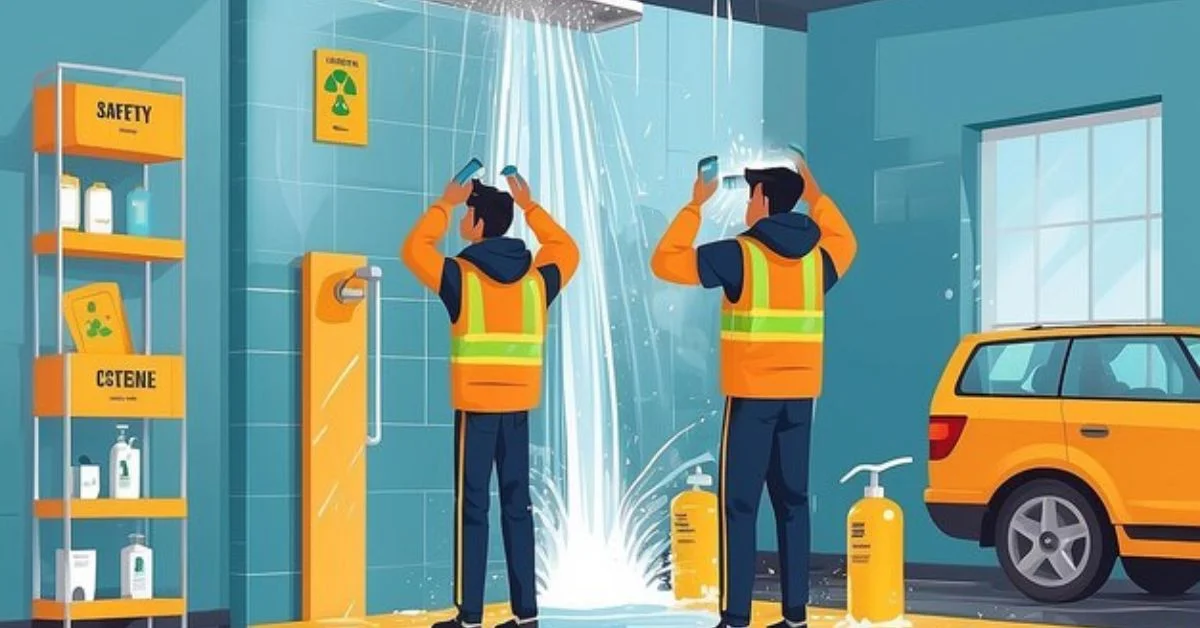Workplace hygiene and safety are paramount concerns in today’s industrial landscape, where employers are tasked with providing comprehensive safety measures for their employees. An essential aspect of these safety measures is the availability of emergency decontamination facilities, particularly in environments where workers may be exposed to hazardous substances. In this context, portable safety showers, including those that operate as a no mains water safety shower, have become an integral part of an organisation’s safety arsenal.
The Importance of Access to Decontamination Facilities
Access to immediate decontamination can mean the difference between minor injuries and severe long-term health effects or even fatalities. Occupational settings such as chemical plants, laboratories, and construction sites frequently pose risks of exposure to harmful chemicals and substances. It is in these settings that portable safety showers serve an indispensable role.
Potential Risks in the Absence of Emergency Showers
Without proper safety facilities, such as a no mains water safety shower, the consequences for employees can be dire. Skin corrosion, irreversible eye damage, and other serious injuries resulting from chemical exposure highlight the absolute necessity for employers to institute robust safety measures.
What Are Portable Safety Showers?
Portable safety showers are self-contained units that can be used to wash away hazardous substances from the body or eyes in the event of accidental exposure. Unlike fixed safety showers, they do not require a connection to a permanent water supply and are thus an ideal solution for remote or temporary work sites without access to mains water supply.
Types of Portable Safety Showers
There are various types of portable safety showers designed to cater to specific needs. Some are equipped with large water tanks and can be stationed at temporary sites, while others are more compact and can be moved easily for immediate response situations.
Benefits of Portable Safety Showers
The key benefit of deploying a portable safety shower within a workplace is its accessibility. Being able to provide immediate decontamination irrespective of location is crucial in mitigating the impact of any hazardous exposure. Additionally, portable showers can be tailored to the specific needs of a site or workforce, ensuring that regardless of the working conditions, employees have the necessary protection.
Ensuring Compliance with Health and Safety Standards
Employers must comply with strict health and safety regulations, which mandate the availability of appropriate emergency decontamination equipment. Portable safety showers contribute towards satisfying these legal requirements, helping businesses to adhere to occupational health and safety standards.
Selecting the Right Portable Safety Shower
When selecting a portable safety shower for a workplace, there are several factors to consider. Firstly, the shower must cater to the types of substances employees are exposed to. Secondly, it must be capable of delivering an ample flow of water to effectively decontaminate the individual.
Considerations for Capacity and Water Supply
Another key consideration is the capacity of the shower. For locations without a reliable water supply, opting for a no mains water safety shower with sufficient storage is important. Furthermore, these portable units must consistently maintain water at appropriate temperatures, as specified by safety standards.
Maintenance of Portable Safety Showers
Occupational safety equipment maintenance is non-negotiable for the functionality of the devices and the safety of the users. Regular inspection, cleaning, and testing of portable safety showers are vital to ensure that they remain operationally ready at all times.
Training and Awareness
In addition to the provision of the correct facilities, employee training on the use and location of portable safety showers is also essential. In the event of an accident, quick and correct use of these facilities by trained personnel can significantly reduce the severity of injuries.
Challenges of Portable Safety Showers
While portable safety showers offer flexibility and accessibility, there are challenges associated with their use. For example, ensuring the shower is filled and that the water within is clean and at an acceptable temperature requires regular monitoring. Developing robust procedures to address these challenges is important for any workplace employing these systems.
Integration into Workplace Safety Plans
A comprehensive workplace safety plan should incorporate emergency showers as part of its infrastructure. Beyond the physical presence of safety showers, a plan should detail their maintenance schedules, accessibility during an emergency, and integration with other safety procedures.
Conclusion
In conclusion, portable safety showers represent a critical component in workplace hygiene and safety strategies. Specifically, a no mains water safety shower enables businesses to provide essential decontamination facilities in diverse working conditions, promoting a safer working environment. As occupational health and safety regulations become increasingly stringent, the use of such showers is likely to become even more prevalent. It is the responsibility of employers to ensure that these life-saving devices are available, properly maintained, and that employees are trained to use them effectively in the unfortunate event of an emergency.
As workplace environments continue to evolve, the machinery of safety must evolve in tandem. By leveraging portable safety shower solutions, businesses demonstrate a commitment to the wellbeing of their employees, fortifying the foundation for a secure and productive workplace culture.
If you find this article helpful, click here for more.









